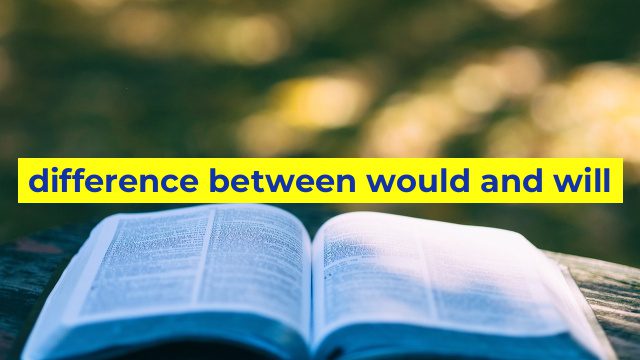The Difference Between Would and Will
Introduction
In the English language, there are many words that may seem similar but have different meanings. Two such words are would and will. They are both used to express future actions, but they have different contexts and implications. In this article, we explore the differences between would and will and when they should be used.
Definition of Would and Will
Would is the past tense form of the auxiliary verb will. It is used to express past habits, hypothetical situations, or probable events in the future.
Will is used to indicate future actions or events, expressing willingness, or determination.
When to Use Would
Would is used to express past habits or actions that were performed repeatedly, but no longer happen. For example, “When I was younger, I would attend dance classes every Friday evening.”
Another usage of would is to express hypothetical situations, often indicated by the word “if” in the sentence. For instance, “If I won the lottery, I would quit my job and travel the world.”
Lastly, would is used to describe something that is probable to happen in the future. For example, “She would probably be a great fit for the job.”
When to Use Will
Will is used to describe actions or events that will happen in the future. For example, “I will go to the concert tomorrow.”
It is also used to express determination or willingness to do something. For instance, “I will do whatever it takes to complete this project on time.”
Will can also be used to make predictions about the future, for example, “It will rain tomorrow.”
The Bottom Line
Would and will are both used to describe future actions, but their usage differs depending on the context of the sentence. Would is often used for past habits, hypothetical events, and probable situations, while will is used to express future actions, willingness, determination, and predictions.
Thus, depending on the context, it is important to use the right auxiliary verb to convey the intended meaning and avoid confusion or misunderstandings.
Table difference between would and will
| Would | Will |
|---|---|
| Used to talk about past habits or actions. | Used to talk about future predictions or actions. |
| It is used to express conditions or hypothetical situations. | Expresses a firm intention or a certain outcome. |
| Used to express polite requests, invitations or expressive courtesy. | Used to express willingness or determination to do something. |
| It is also used as a polite way of declining something. | Used to report current events or something that is going to happen in the near future. |

